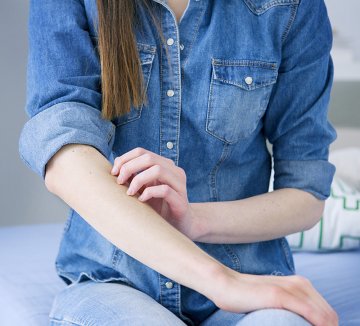Is your skin dry and rough? Do you have white blotches on your cheeks and arms and or dark circles under your eyes? You may have eczema.
What is ECZEMA?
Eczema is “angry” skin much like asthma is “angry” lungs. The defining symptom is the ITCH.
Eczema is a broad term, a synonym for dermatitis, which simply means “inflammation of the skin”. When most people say eczema, they usually mean “atopic eczema”. This is the chronic itchy rash of childhood. A textbook case would begin during infancy or early childhood. And would present as itch scaly pink patches, especially in the folds of the arms and legs, behind the knees and elbows.
Atopic dermatitis is part of the “atopic triad,” which also includes asthma and allergic rhinitis, also known as seasonal allergies. Some patients have two or all three of these conditions.

Treatment Options
Treatment of eczema consists of a strict sensitive skin care regimen with the use of the right hypoallergenic products, appropriate topical steroids, treatment of bacterial colonization of the skin and keeping nails short to avoid scratching.
There is a theory that bacteria (usually staph) on the skin plays a role in flaring up eczema. It is called the “super-antigen” theory. Instead of acting like a normal antigen and activating the part of the immune system designed to fight bacteria, it acts as a “super” antigen in eczema patients and activates “everything” so that your immune system goes haywire and results in itchy eczema.
To counteract the bacteria, we try a once-a-week bleach baths with a 1/8 cup of plain bleach diluted into a full bathtub of water. This does not take the place of topical steroids, but can help quite a bit.
If despite your best efforts, your eczema continues to flare up, schedule a visit to your dermatologist. We have an arsenal of prescription and over-the counter remedies to recommend.











